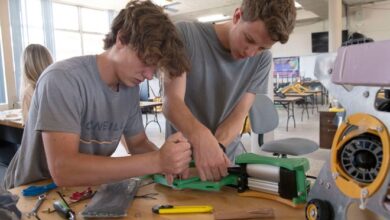Swiss startup to advance collaborative robots with GenAI humanoid hand

The power of generative AI has further ignited the race for advanced humanoid robots, promising more capable machines that can learn and deal with unknown environments and challenges.
Amid increasing competition across the globe, Switzerland-based mimic is also throwing its hat in the ring. The startup has raised a pre-seed round of $2.5mn (€2.3mn) to bring the first GenAI-powered collaborative robot to market.
A spinoff from ETH Zurich, mimic was founded in 2024 by a team of three researchers working at the intersection of robotics and AI.
Aiming to address workforce shortages, the team has developed a robotic humanoid hand that can integrate into existing manual labor workflows and perform repetitive or demanding tasks.
“Most use cases are stationary and do not require a full humanoid robot with legs,” said co-founder Stephan-Daniel Gravert.
“That’s why we focus data-collection and hardware ingenuity on a universal robotic hand that is compatible with off-the-shelf industrial robotic arms for positioning.”
Merging humanoid robots with generative AI
The young startup has also developed its own foundation AI model to infuse the humanoid hand with reasoning skills and the ability to learn.
According to mimic, the use of generative AI enables the robot to understand and imitate any behaviour by watching a human perform it. This broadens the scope of tasks a robot can perform. It also reduces the need (and cost) for constant reprogramming.


“Conventional automation leaves a huge gap of tedious, low to medium volume manual labor tasks that often fall under the table because they are too complex or not economical to automate,” said mimic’s co-founder Stefan Weirich.
According to Weirich, AI-driven robotic manipulation can effectively address these challenges.
Mimic plans to launch its humanoid later this year. It targets industries that involve repetitive and hard-to-automate tasks that require complex motor skills.
The startup is part of a strong robotics ecosystem in Switzerland. According to the International Federation of Robotics (IFR), Switzerland ranks among the top ten countries with the highest robot density in the workforce. The county also houses some of the world’s most prominent robotics and automation companies, including ABB and Swisslog.




